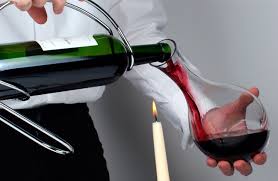Page 3 of Times
Let the wine breathe? It’s just a waste of drinking time
The proper way of getting the best out of the wine — or old-fashioned nonsense? The debate about whether wine is improved by being allowed to breathe has been revived after several experts said that most modern wines could be drunk straight away without any extra exposure to the air.
Martin Isark, a wine writer, said: “The myth of letting it stand open for a period of time will have little or no effect on taste.”
Most experts agree that merely removing the cork, as opposed to pouring the wine into a decanter, will do little to expose the wine to oxygen as the contact area between wine and air in the neck of the bottle is so small.
Wine is decanted as a way of getting rid of any sediment, but few wines throw a significant amount of sediment.
Mr Isark said that in the past some wines, such as big Barolos with “tongue-rasping tannins”, needed exposure to oxygen to soften the tannins. “They are a rare beast now,” he said. “Technology has improved tremendously since then.”
Some sturdy wines can be improved by decanting or even decanting twice, he said. “But if it is a 1945 Mouton [Rothschild], for instance, you can destroy the wine by doing that.
“A beautifully shaped glass is the answer to rewarding the palate, not opening the bottle two hours before you’re ready to drink it.”
Charlie Holland, head winemaker at the Gusbourne estate in Kent, said that some wines could be improved by aeration, including sparkling wines.
“I find it particularly useful with young wines that are well built,” he said. “If you have a wine that is quite tannic, or dense, they can be quite closed.
“By aerating them and letting them breathe, you are allowing them to open up. With our pinot noir, when it is very young — six months or a year — it can use a bit of encouragement to shed some of that tightness..
“Most of the wines you get from a supermarket, especially at the cheaper end of the scale, are designed to be ready to be drunk.”
Giles MacDonogh, an author who has judged at professional wine tastings, said: “Old wines are often only at their best for an hour or two. It would be a crying shame to miss that hour by decanting too early.”
Analysis
Jane MacQuitty, The Times wine critic
Wine does not have lungs and does not breathe. All that happens when you open a bottle is that the contents are exposed to air and the wine within starts to oxidise. Yet the fallacy persists that, shazam, magically your £4.99 bottle of Argentinian Malbec will turn into the finest cru classé claret, if only you decant it at breakfast for delectation at dinner. Maybe we should be grateful that decanting myths have moved on since the 1970s, when skinflints would decant cheap Spanish or Argentinian reds 24, or even 48, hours, in advance, and dinner guests would have to force these dead-as-a-dodo wines down.
The only reason to decant wine, especially venerable claret or port, is to pour off any sludgy sediment it might have that, otherwise, will make glasses appear cloudy and taste muddy. Modern filtration methods have put paid to all that. Any young, tight, wines don’t need decanting either, just splash them into your glass and give it a twirl or two for them to open up.
